Each year in June, SHO-BOND holds the Construction Engineering Technology Conference. Each regional office selects three to four of their construction projects for that year, and a representative gives a presentation on a technically-outstanding advanced case study. The conference is a major event that attracts around 100 employees from across Japan to the head office building, and is streamed online to all regional offices and branches. As each presenter is representing their own regional office, they rehearse thoroughly with the support of their office before the day of the presentation. After the presentations, awards for excellence are presented and employees interact with one another, thereby encouraging and motivating participants to do their best. We also offer other programs as the need arises to broaden the knowledge of our engineers, such as special lectures by outside academics.
Employees are the most valuable asset of the SHO-BOND Group. For the Group to survive and grow while fulfilling its social responsibilities and contributing to the development of a sustainable society, we believe every employee of the Group must have a dream and feel a sense of fulfillment by demonstrating their abilities.
Therefore, we aim to create a workplace where every employee is mentally and physically healthy and can continue their work for a long time with confidence while having the opportunity to maximize their abilities and potential.
Recruiting
Explaining the need for infrastructure repair and reinforcement and the social significance of these activities is an effective way to attract new university or technical college graduates, especially in the fields of civil engineering and architecture. SHO-BOND therefore invites students and instructors to visit the Technical Research Institute and Tsukuba Training Center and regularly sends our engineers to give special lectures on the campus.
In terms of our mid-career recruiting, we are working to secure a diverse range of human resources in line with our business strategy by establishing various recruiting channels such as an employee referral system, as well as hiring through recruitment agencies.
Talent Development
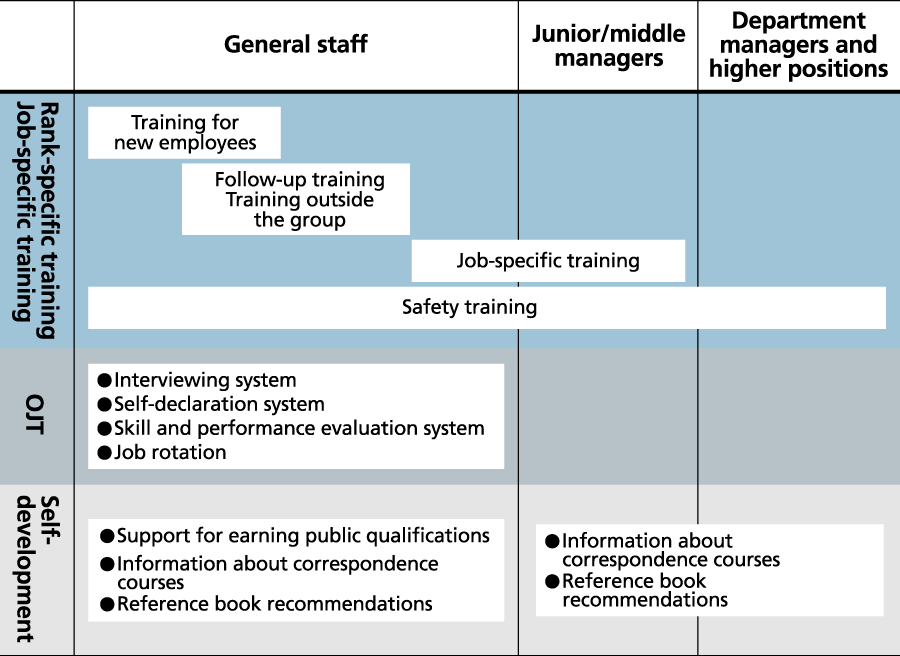
Experience is a critical component of repair and reinforcement construction activities. For this reason, we provide education mainly through on-the-job training, entrusting our trainees with tasks from a young age and giving them responsibility for their own work while encouraging them to solve work-related problems on their own to improve their abilities.
As for off-job training, we select effective and efficient learning methods for each theme, and offer our employees various training opportunities according to their stage of growth, such as internal/external education programs and e-learning. In 2021, we opened the Tsukuba Training Center, which is adjacent to the Technical Research Institute, for practical training programs. We will continue to develop the skills of everyone in the SHO-BOND Group from a long-term perspective while upgrading our training programs and encouraging our employees to learn new skills in a well-planned manner.
In FY2025, we have modified our training programs to address not only technical training but also human rights, the environment, and other social needs.
Rank-Specific Training
SHO-BOND has training programs structured to equip employees with the required knowledge and skills according to their specific job levels. These follow-up training programs extend from training for new employees to training for people with more experience, and cover subjects selected to enable the participants to advance their careers. Furthermore, the Tsukuba Training Center allows employees to obtain practical knowledge by providing training that closely mirrors the actual conditions at job sites.
Training for new employees
Training for new employees is designed as a first phase to let them acquire know-how essential for working at the Group and become the core members of the workforce. This one-year training consists of an introductory course mainly in the form of classroom lectures and practical training at workplaces where new employees are temporarily assigned.
Introductory training

The main purposes of the 45-day introductory training are to (1) give them the proper mindset as a businessperson, (2) acquire basic knowledge about their jobs, and (3) foster a sense of solidarity among them as employees of the Group.
Many of the new employees have majored in civil engineering and construction in college or university but most of them are introduced to the maintenance field for the first time at SHO-BOND. We design training programs in a way that allows them to acquire the fundamental knowledge needed to advance to the on-the-job training phase.
On-the-job training
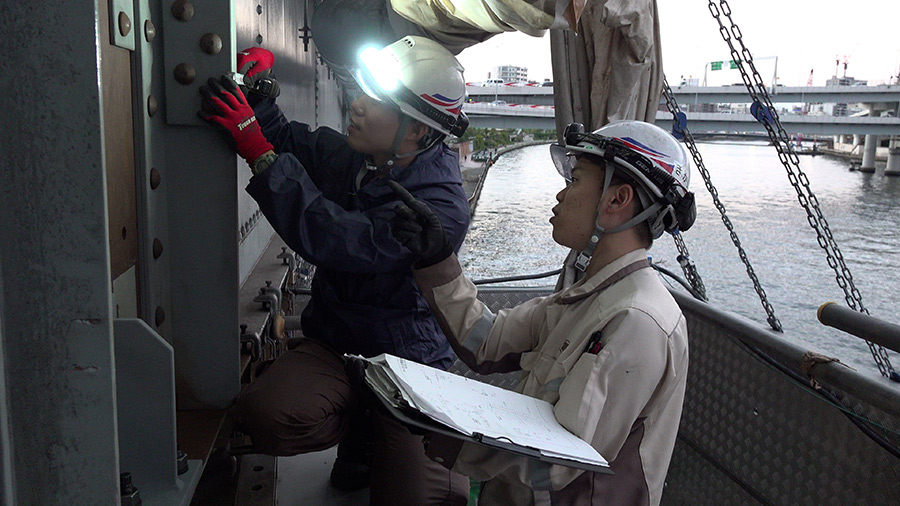
On-the-job training accounts for the majority of the one-year training for new employees. This training is an important process for new employees to apply the knowledge acquired during the introductory training under the guidance of experienced employees.
We believe that the fundamentals of every job within the Group are learned at work sites, regardless of future career paths. This is why on-the-job training is provided mainly at construction sites, where new employees acquire repair and reinforcement skills.
Support for obtaining qualifications
The SHO-BOND Group gives employees a variety of support for earning professional qualifications and other certifications required for their jobs. In addition to covering the cost of qualification tests and registrations, SHO-BOND also provides monthly salary increases to employees who obtain certification. For Professional Engineer and other difficult qualifications, we provide supplementary lessons by qualified employees and award commendations at the time of certification. Through these measures, the number of those qualified has been steadily increasing.
We will continue to expand these programs in order to enable our staff to earn both the qualifications required for their work and also advanced ones.
Construction Engineering Technology Conference
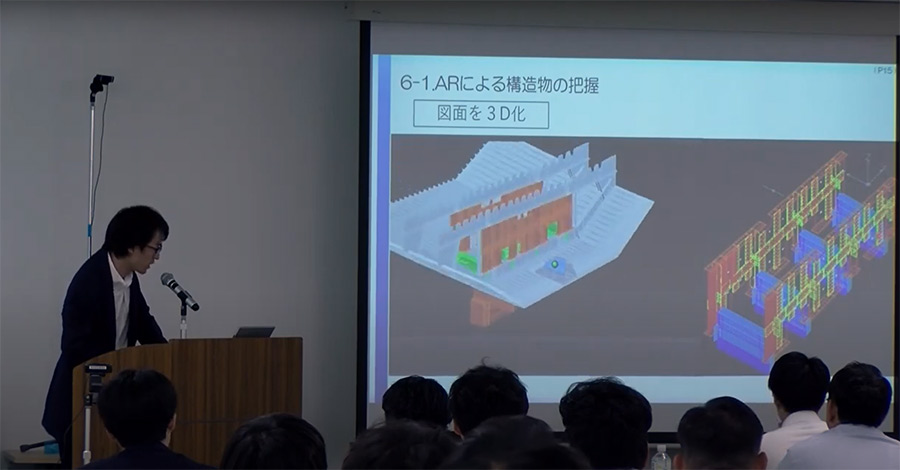
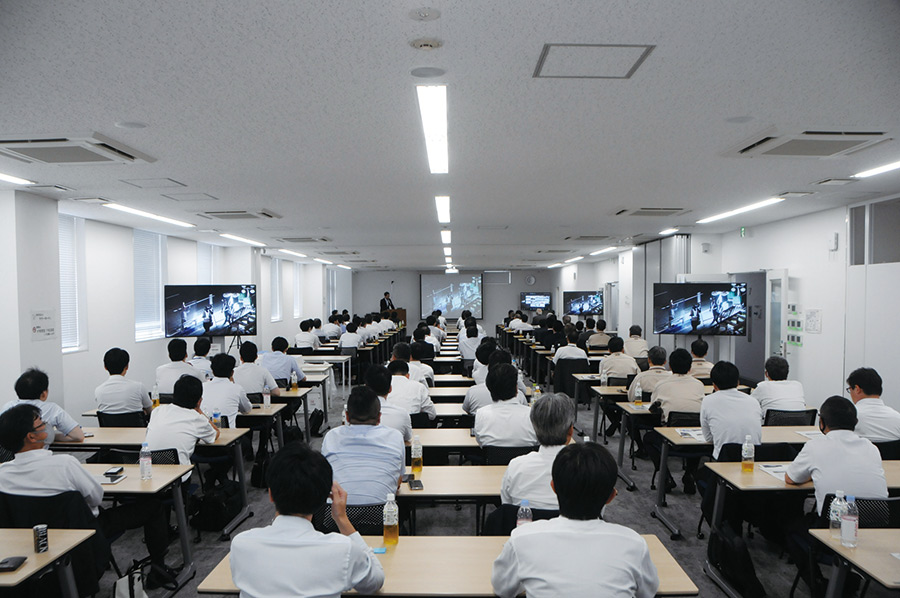
Support for earning a PhD
The SHO-BOND Group has a Graduate School Support Program that provides assistance to employees who want to upgrade their technological skills by earning a PhD.
Periodically, employees can submit applications to participate in this support program. Individuals who are selected receive payments to cover tuition and time off as needed, and other forms of assistance for completing a PhD program.
Tsukuba Training Center
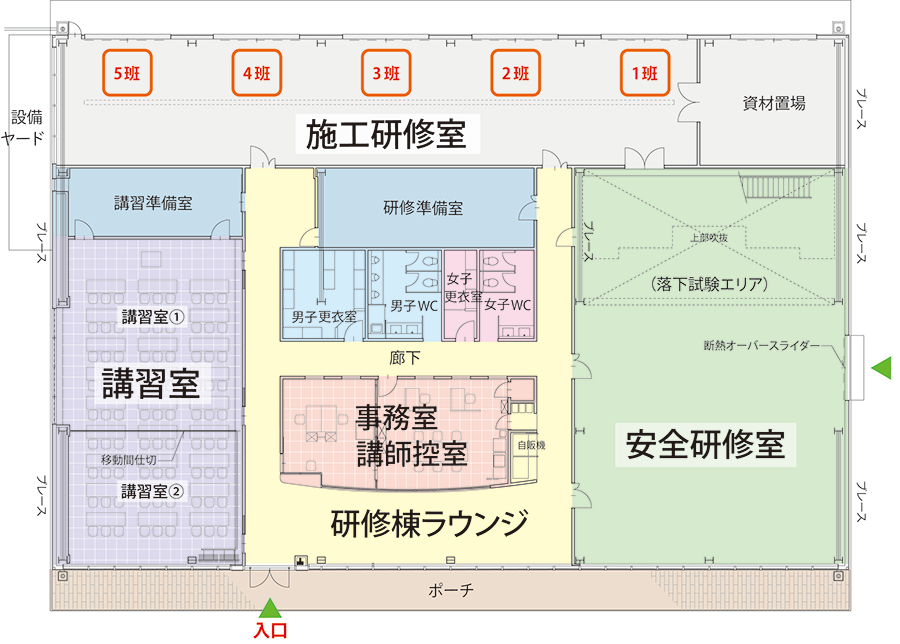
- Training Building (total floor space of approx. 1,000m²)
- Seminar room: A classroom for up to 54 participants
- Construction training room: A seminar room where participants can learn how to handle repair materials
- Safety training room: A seminar room where participants can experience the significance of safety activities
- Training Bridge (10m x 20m)
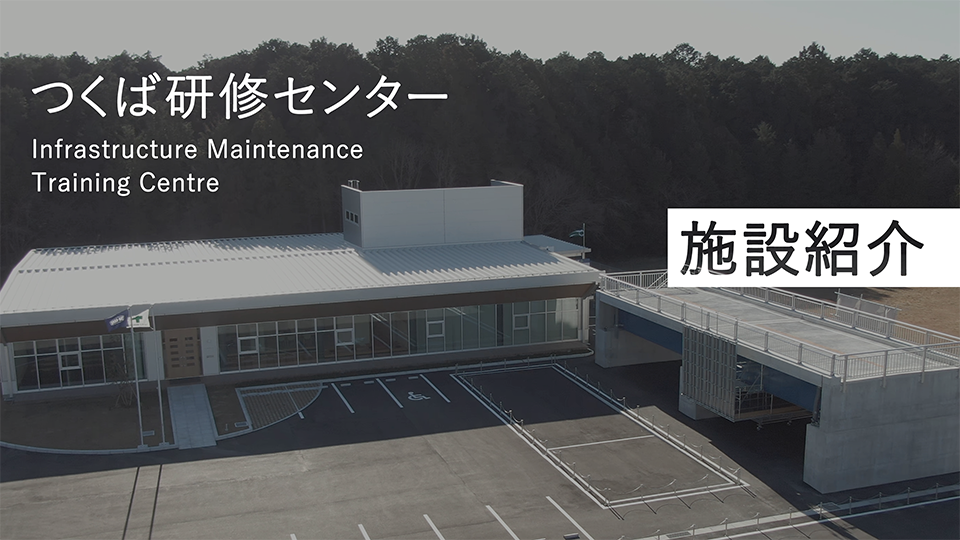
Employee Retention
SHO-BOND conducts monthly surveys of employee job satisfaction, goals, and other items with an emphasis on younger employees and individuals returning from leave. Using the results, human resources personnel perform timely interviews and support those in need with the cooperation of their supervisors and others. These activities let employees know that there is a framework in place to help them deal with various problems and relieve their anxiety.
In addition, we offer opportunities to work at home and select staggered working hours for more flexibility. Measures like these to constantly improve the workplace environment based on the employees’ needs have resulted in a higher retention rate.
Retention Management Based on HR System
In FY2025, we have reformed our HR system in line with the changing times and environment, and have launched a new system emphasizing growth, fulfillment, a sense of security, and a sense of satisfaction based on an awareness of issues identified in our organizational analysis. Under our new HR system, we will improve our retention management and maximize the value generated by our human capital.
We will also continue to improve our employee engagement and further reduce our turnover by raising awareness on career development and expanding our employee training programs.
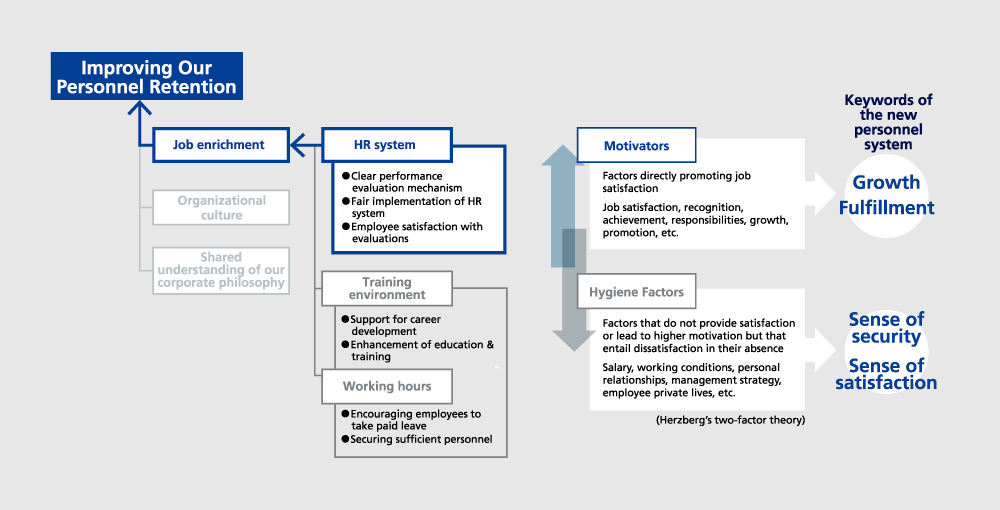
Workplace Environment Initiatives
Maintaining Proper Working Hours
In 2014, we began improving our working system and implementing no-overtime days with the aim of mitigating long working hours and encouraging employees to take their paid leave. Since then, we have been managing our employees’ working hours and leave uptake, improving HR operating efficiency through the introduction of IT tools, and promoting a reduction in total working hours.
To foster a working environment that encourages our employees to take their paid leave, we established a month encouraging paid leave and raised awareness within the Group. As a result, we achieved the goal of “0 employees with less than 110 days off per year” in FY2023. We have continued to take action concerning paid leave to increase employees’ use of their paid holidays.
From FY2024, a work overtime limit regulation has been applied to the entire construction industry. Our efforts to shorten total working hours and increase the use of paid leave by closing the office for eight days in a four-week period have been successful, and we are fully compliant with the legal overtime work limit but we will continue our efforts to further decrease total working hours.
Selection of Employment Category and Self-Declaration System
The SHO-BOND Group allows employees to flexibly choose an employment category with or without transfers to different locations. Several of our employees switch their work courses each year to accommodate their different life stages. The self-declaration system allows individuals to confirm their employment category and job status once a year.
Supporting Work-Life Balance and Childcare/Nursing Care
We provide an employee assistance program that exceeds the legal requirements, and promote the use of this program to allow employees to balance their work with their childcare or nursing responsibilities without anxiety. To increase the use of childcare leave by male employees, we started a system in 2019 of making one-off payments when they return from childcare leave. After creating a pamphlet and raising awareness of this system, the number of male employees taking childcare leave increased along with the number of employees taking extended childcare leave.
We have also established a telecommuting system and introduced staggered work hours for childcare and nursing care, and we are also taking other measures to provide flexible work arrangements to meet our employees’ individual circumstances.


In 2020, SHO-BOND CORPORATION received the “Kurumin” certification as a childcare support company. After continuing various support initiatives, the company was re-certified in December 2025 under the updated standards. At the same time, its efforts and achievements were recognized, and it was awarded the “Platinum Kurumin,” an advanced certification granted to top-tier childcare support companies.
We will continue to create a workplace where all of our employees can work comfortably while also considering their needs through our employee satisfaction surveys and other means.
Diversity and Inclusion
To maintain diversity in our workforce, the SHO-BOND Group is striving to recruit diverse new employees, and follows non-discriminatory fair employment practices. We also select our management personnel based solely on each individual’s capabilities and performance.
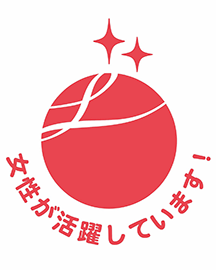
In terms of female participation in our workforce, SHO-BOND is striving to maintain a regular female recruiting rate of at least 15% with a medium- to long-term perspective of increasing our percentage of female managers. We have also set up workplace environment measures, training programs, and follow-up surveys for female engineers, which have resulted in a high employee retention rate. In October 2024, SHO-BOND CORPORATION received the “Eruboshi” second level certification as a company that has made outstanding efforts in promoting female participation.
To retain senior employees and continue benefiting from their many years of experience, we have continuously raised their remuneration.
We have continued to actively recruit and promote mid-career hires for many years, and in recent years, our mid-career hires accounted for about half of all employees and about 30% of all managerial positions.
The ratio of our foreign national employees has been gradually increasing. We will continue to hire foreign nationals not only in Japan but also locally in other countries.